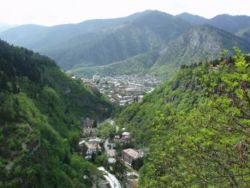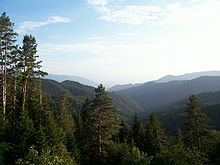
Borjomi-Kharagauli National Park
Encyclopedia
.jpg)

Georgia (country)
Georgia is a sovereign state in the Caucasus region of Eurasia. Located at the crossroads of Western Asia and Eastern Europe, it is bounded to the west by the Black Sea, to the north by Russia, to the southwest by Turkey, to the south by Armenia, and to the southeast by Azerbaijan. The capital of...
, situated in the Lesser Caucasus
Lesser Caucasus
Lesser Caucasus is one of the two main mountain ranges of Caucasus mountains, of length about 600 km....
, southwest to the nation’s capital of Tbilisi
Tbilisi
Tbilisi is the capital and the largest city of Georgia, lying on the banks of the Mt'k'vari River. The name is derived from an early Georgian form T'pilisi and it was officially known as Tiflis until 1936...
.
One of the largest national park
National park
A national park is a reserve of natural, semi-natural, or developed land that a sovereign state declares or owns. Although individual nations designate their own national parks differently A national park is a reserve of natural, semi-natural, or developed land that a sovereign state declares or...
s in Europe
Europe
Europe is, by convention, one of the world's seven continents. Comprising the westernmost peninsula of Eurasia, Europe is generally 'divided' from Asia to its east by the watershed divides of the Ural and Caucasus Mountains, the Ural River, the Caspian and Black Seas, and the waterways connecting...
, it includes six administrative districts stretching from the resort of Borjomi
Borjomi
Borjomi is a resort town in south-central Georgia with a population estimated at 14,445. It is one of the districts of the Samtskhe-Javakheti region and is situated in the northwestern part of the region in the picturesque Borjomi Gorge on the eastern edge of the Borjomi-Kharagauli National Park...
to the town of Kharagauli
Kharagauli
kharagauli is an administrative center of Kharagauli district in Georgia. It is situated on both banks of Chkherimela river in a narrow and deep gorge, 280-400m above the sea level....
. The total area of the park is 5, 3 thousand square kilometers, i.e., 7.6% of the total territory of Georgia. The park was founded in 1995 and officially inaugurated in 2001.
Its particular uniqueness is diversity of geographical and ecological zones, landscapes, historical monuments and rich flora and fauna. The park has rapidly developing tourist infrastructure.
History
The history of the park dates back to Medieval times when it was used primarily by the local aristocracy for hunting.When Georgia lost its independence and became part of the Russian Empire, the Grand Duke Michael Nicolaievich
Grand Duke Michael Nicolaievich of Russia
Grand Duke Michael Nikolaevich of Russia was the fourth son and seventh child of Tsar Nicholas I of Russia and Charlotte of Prussia...
was given the post of Governor General of Transcaucasia. He found the local beauty of the Borjomi park so impressive he decided to build his personal summer residence
Likani
Likani is a townlet in Georgia’s Samtskhe-Javakheti region, located at the west end of the town of Borjomi in the Borjomi Gorge, some 160 km west of Tbilisi, capital of Georgia...
there.
Noticeable changes to the park came when the Grand Duke Michael restricted any lumbering or hunting without permission, thus laying the foundation for the park's future.
In 1995, the Borjomi-Kharagauli National Park was endorsed and created with the support of the World Wildlife Fund and the German government, and was officially inaugurated in 2001.

Environmental Concerns
The Baku–Tbilisi–Ceyhan pipeline skirts the edge of this National Park and crosses its watershedDrainage basin
A drainage basin is an extent or an area of land where surface water from rain and melting snow or ice converges to a single point, usually the exit of the basin, where the waters join another waterbody, such as a river, lake, reservoir, estuary, wetland, sea, or ocean...
. The decision to run the BTC Pipeline near this pristine region drew considerable ire from environmental groups who allege that a leak could disrupt the Borjomi ecosystem. These groups also point out that the area is a source of frequent landslides that could increase the chance of a breach of the pipeline. They also allege that simply building a pipeline in this region will have a negative effect on sales of Borjomi mineral water. Mineral water makes up a significant portion of Georgia exports. In August 2008, more than 300 hectare
Hectare
The hectare is a metric unit of area defined as 10,000 square metres , and primarily used in the measurement of land. In 1795, when the metric system was introduced, the are was defined as being 100 square metres and the hectare was thus 100 ares or 1/100 km2...
s of forest in the park were burnt
2008 Borjomi wildfire
The 2008 Borjomi wildfires started in the Borjomi Gorge, Georgia on August 15, 2008 and lasted for several days to come, destroying of the Borjomi-Kharagauli National Park, one of the largest national parks in Europe....
in what Georgia claimed was an ecocide
Ecocide
The neologism ecocide can be used to refer to any large-scale destruction of the natural environment or over-consumption of critical non-renewable resources...
by Russia
Russia
Russia or , officially known as both Russia and the Russian Federation , is a country in northern Eurasia. It is a federal semi-presidential republic, comprising 83 federal subjects...
.Main Hearths of Fire Localized in Borjomi-Kharagauli Forest Reserve

